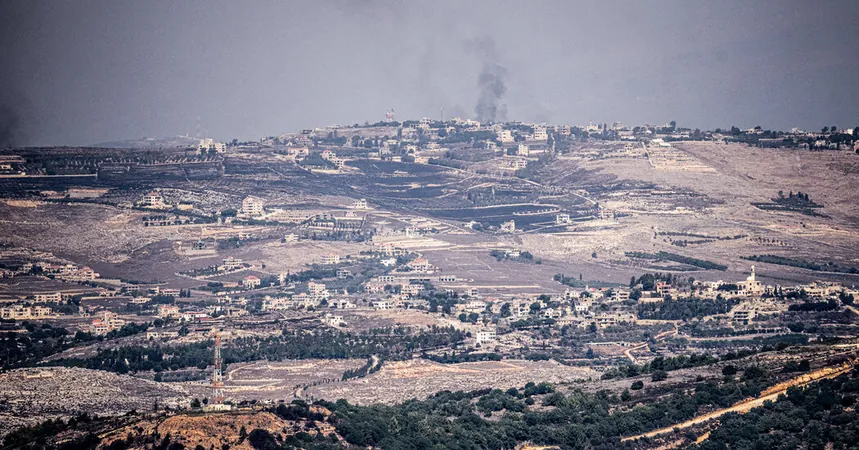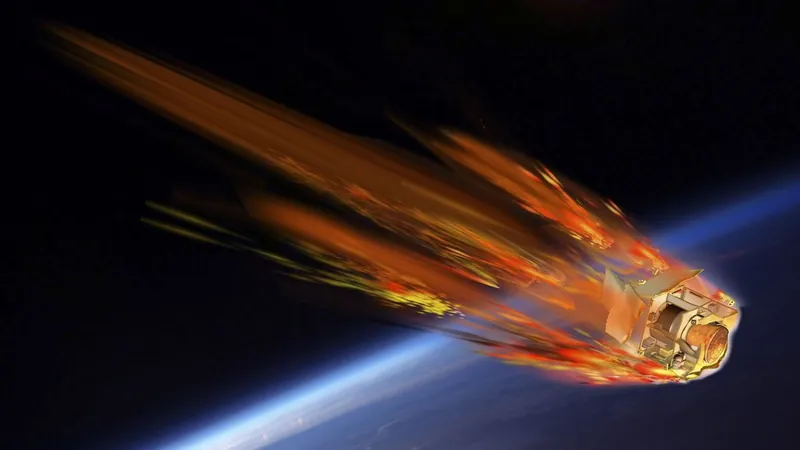
Chaos Unfolds in Lebanon as Israel Launches Widespread Strikes Against Hezbollah: Key Developments and Analysis
2024-10-05
Author: Wai
Tensions escalate in Lebanon
as Israel intensifies its military operations against Hezbollah, particularly following the assassination of Hassan Nasrallah, the group's former leader. Recent Israeli airstrikes have targeted key figures within Hezbollah, including Hashem Safieddine, who is seen as Nasrallah’s presumed successor. While it's unclear if Safieddine survived the assaults, reports indicate that Israel successfully killed two high-ranking Hamas commanders in Tripoli amidst its ongoing campaign.
Hezbollah's Retaliation
On the battlefield, Hezbollah retaliated by launching approximately 90 rockets into northern Israel, although most were intercepted by Israeli air defenses, thankfully resulting in no immediate injuries. However, the conflict is raising alarms about a potentially wider war that could draw in Iran, a major backer of both Hezbollah and Hamas. Iranian Supreme Leader Ayatollah Ali Khamenei warned that Iran could escalate its attacks on Israel if deemed necessary.
Diplomatic Movements and Humanitarian Crisis
As military actions continue, Iranian Foreign Minister Abbas Araghchi has embarked on a diplomatic tour, visiting Syria and Lebanon to discuss potential ceasefire arrangements. This comes as the humanitarian situation in Gaza worsens, prompting renewed evacuation warnings from Israeli forces, now affecting thousands of residents.
The U.S. government is closely monitoring the conflict, with President Biden remarking that Israel has not yet decided on its strategic response to Iranian provocations, suggesting that exploring alternatives might be prudent.
Tragically, the conflict claimed the life of Kamel Ahmad Jawad, an American citizen from Dearborn, Michigan, reportedly killed in an Israeli airstrike. His family shared poignant memories of his dedication to humanitarian efforts in Lebanon, highlighting his commitment to easing the burdens of those suffering from the war. Reports indicate his tragic death is part of a larger humanitarian catastrophe, with over 1,600 people now dead and more than 1.2 million displaced across Lebanon due to ongoing Israeli strikes.
Several hospitals in southern Lebanon have ceased operations due to Israeli bombardments, causing grave concerns for civilian healthcare amidst the conflict. Specific hospitals, such as St. Therese’s, report extensive damage, raising alarm about the availability of medical services for those affected.
The Broader War Landscape
The situation is further complicated by continued skirmishes in the region. The Houthis in Yemen have responded with missile strikes against various targets, positioning their attacks against U.S. and allied interests. These developments underscore the potential for a multi-front conflict as Iran reportedly increases its military presence near the region.
In this charged environment, Israeli officials maintain that the only way to ensure the safety of citizens is through decisive military actions against Hezbollah. Concerns have mounted regarding Hezbollah's ongoing rocket firings, which aim to challenge Israel's military operations in the North.
While public sentiment in Lebanon is complex, with many citizens expressing frustration with Hezbollah’s role in escalating the conflict, the political environment is rife with instability. As the country grapples with catastrophic economic disruptions and political fragmentation, Hezbollah remains one of the few entities positioned to respond to perceived threats against Lebanese sovereignty.
Is There Hope for a Ceasefire?
As both sides ramp up military actions, hopes for a ceasefire appear bleak. Reportedly, Hamas has shown little interest in negotiating terms, asserting that they will continue hostilities until their demands regarding the conflict in Gaza are met. This is compounded by the uncertain fate of key leaders like Hamas head Yahya Sinwar, who is reportedly isolated in Gaza and confronting pressures from Israeli military operations.
The landscape of Middle Eastern geopolitics is at a precarious juncture. With parties like Iran, Hezbollah, and Hamas involved in a complex web of alliances and hostilities, the potential for an even broader regional conflict looms large. As Israel vows to secure its northern border, international observers remain vigilant for any shifts that might herald an escalation or a new diplomatic breakthrough.
The unfolding situation not only raises urgent humanitarian concerns but also stresses the precarious balance of power, igniting fears of a protracted and bloody conflict that could embroil the entire region.



 Brasil (PT)
Brasil (PT)
 Canada (EN)
Canada (EN)
 Chile (ES)
Chile (ES)
 España (ES)
España (ES)
 France (FR)
France (FR)
 Hong Kong (EN)
Hong Kong (EN)
 Italia (IT)
Italia (IT)
 日本 (JA)
日本 (JA)
 Magyarország (HU)
Magyarország (HU)
 Norge (NO)
Norge (NO)
 Polska (PL)
Polska (PL)
 Schweiz (DE)
Schweiz (DE)
 Singapore (EN)
Singapore (EN)
 Sverige (SV)
Sverige (SV)
 Suomi (FI)
Suomi (FI)
 Türkiye (TR)
Türkiye (TR)